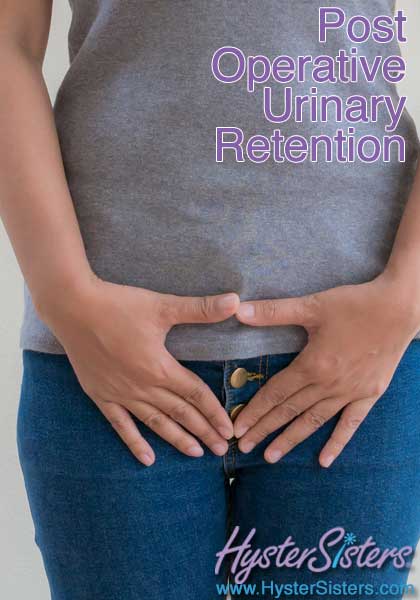HysterSisters Articles for Hysterectomy
SHARING IS CARING
Post Operative Urinary Retention
From the Pelvic Floor Articles List
 I'm having trouble emptying my bladder since my hysterectomy. What should I do?
I'm having trouble emptying my bladder since my hysterectomy. What should I do?
If you’re having issues emptying your bladder after your hysterectomy, you are not alone. Post-Operative Urinary Retention (POUR) is a frequent occurrence after gynecologic surgery. It is especially prevalent in women who’s surgery is for the correction of
urinary incontinence or
pelvic organ prolapse. Undergoing
multiple procedures at the same time to treat both incontinence and prolapse may also increase your likelihood of experiencing post-operative urinary retention. Estimates of women who have this complication range from 2.5% – 43%. While there is no standard definition for POUR, it is characterized by incomplete bladder emptying and an increase in the volume of retained urine.
Risk Factors
Known risk factors for POUR include the type of surgery performed, the
type of anesthesia used, use of post-operative opioid pain medication, patient age, and baseline bladder dysfunction. While having a catheter during any surgery increases the risk of bladder issues and
urinary tract infection (UTI), the risk of POUR is increased with gynecologic surgery and anorectal surgery. This is likely due to heightened sensitivity in these regions that can lead to increased pain, increased opioid use, and possible disruption of small peripheral pelvic nerve branches that play a role in bladder sensation.
Diagnosis
Although POUR is a condition that can have serious consequences if left untreated, it is easily diagnosed and typically self-resolves. The key to management of POUR is identifying it quickly, as failure to identify POUR can lead to serious issues. Prolonged bladder distention can lead to UTI, dysfunction of the muscles of the bladder, and even damage to the surgical repair. All patients undergoing pelvic surgery, especially for the correction of incontinence or prolapse, should have an assessment of voiding function prior to discharge from hospital.
There are several ways to assess voiding function but standard practice is by measuring the residual urine in the bladder after voiding (post-void residual). This is often called a voiding trial. Depending on the surgeon and the hospital, this may only involve documentation of ability to void. In other cases, a voiding trial may consist of measurement of voided volume, followed by measurement of post-void residual. Generally, a post-void residual of less than 100-200 ml is considered passing. The retained urine in the bladder may be measured by catheterization or by a transabdominal ultrasound scan of the bladder.
Management
Management of POUR is generally straightforward. The goal is to empty the bladder to avoid long-term damage to bladder integrity and function. Immediate catheterization is always the first step. This may be performed either with in-and-out catheterization or with placement of an indwelling Foley catheter. Although placement of an indwelling Foley catheter is easier, there are several drawbacks to prolonged use of this method. Indwelling catheters lead to increased rates of UTI compared to intermittent catheterization. Intermittent catheterization may also decrease the length of time your bladder depends on using a catheter. Depending on your surgeon and your circumstances, you may
go home from hospital with a catheter, or taught how to
self-cath when your bladder is full.
The decision for when to discontinue catheter-assisted bladder drainage can be assessed on an ongoing basis by measurement of post-void residual. Your surgeon will ask to see you at specific points in your recovery to assess your bladder function.
The rate of retention issues beyond 4 weeks is low, ranging from 2%–4% for a tension-free transvaginal mesh sling. POUR generally resolves within 4–6 weeks with the assistance of some form of bladder drainage to prevent damage to the bladder.
When POUR does not resolve, more active management may be required. Prolonged retention is more common with incontinence repair than with prolapse repair. Interventions may include sling stretching, sling release, partial sling resection, urethral dilation, or urethrolysis (removal of
adhesions in the urethra). Sling release offers the least invasive approach and may be the first course of intervention. Most surgeons wait at least 4 weeks post-surgery as most cases of retention will resolve during that time.
This content was written by staff of HysterSisters.com using data from the National Center for Biotechnology Information website. This content was written by non-medical professionals based on discussions, resources and input from other patients for the purpose of patient-to-patient support.
05-14-2017 - 06:21 PM
SHARING IS CARING
Do you have a question?
If you have a medical support question related to this article, come JOIN US in our HysterSisters Community Forums. You will receive helpful replies to your questions from our members. See you there!
HysterSisters Articles
Diagnosis
Options to Hysterectomy
Treatment Alternatives
Pre-Op Hysterectomy
Post-Op Hysterectomy
Separate Surgeries
Hormone and Menopause
Intimacy after Hysterectomy
Pelvic Floor
Separate Surgeries
Fitness after Hysterectomy
GYN Cancer
Breast Health
Grief and Loss
Endometriosis
Uterine Fibroids
GYN Genetics
Hysterectomy Stories
Ask A Doctor

Find a Surgeon
James Kondrup, M.D.
161 Riverside Drive
Suite 109
Binghamton NY 13905
607-770-7074 |
Aileen Caceres, M.D.
Center for Specialized Gynecology/Florida Hospital
410 Celebration Place, Suite 302
Celebration FL 34747
(407) 303-4573 |
Arnold Advincula, M.D.
Columbia Ob/Gyn Midtown
51 West 51st St, 3rd FL
New York NY 10019
(855) 75-OBGYN |
Antonio Gargiulo, M.D.
Brigham and Women's Hospital
75 Francis Street
Boston MA 02115
617-732-4222 |
Mayra J. Thompson, M.D.
5323 Harry Hines Blvd Dept OBGYN
Dallas TX 75290
214-645-3888 |
Caren C Reaves, M.D.
Caring for Women
2805 S. Mayhill Rd
Denton TX 76208
940-591-6700 |
Lori Warren, M.D.
3900 Kresge Way
Suite 30
Louisville KY 40207
502-891-8700 |
Lauren Streicher, M.D.
Gynecologic Specialists of Northwestern, S.C
680 N. Lake Shore Dr., Suite 117
Chicago IL 60611
(312)654-1166 |
Debra Richardson, M.D.
Gynecological Oncology Clinic - SW Med
2201 Inwood Road Suite 106
Dallas TX 75390
214-645-4673 |